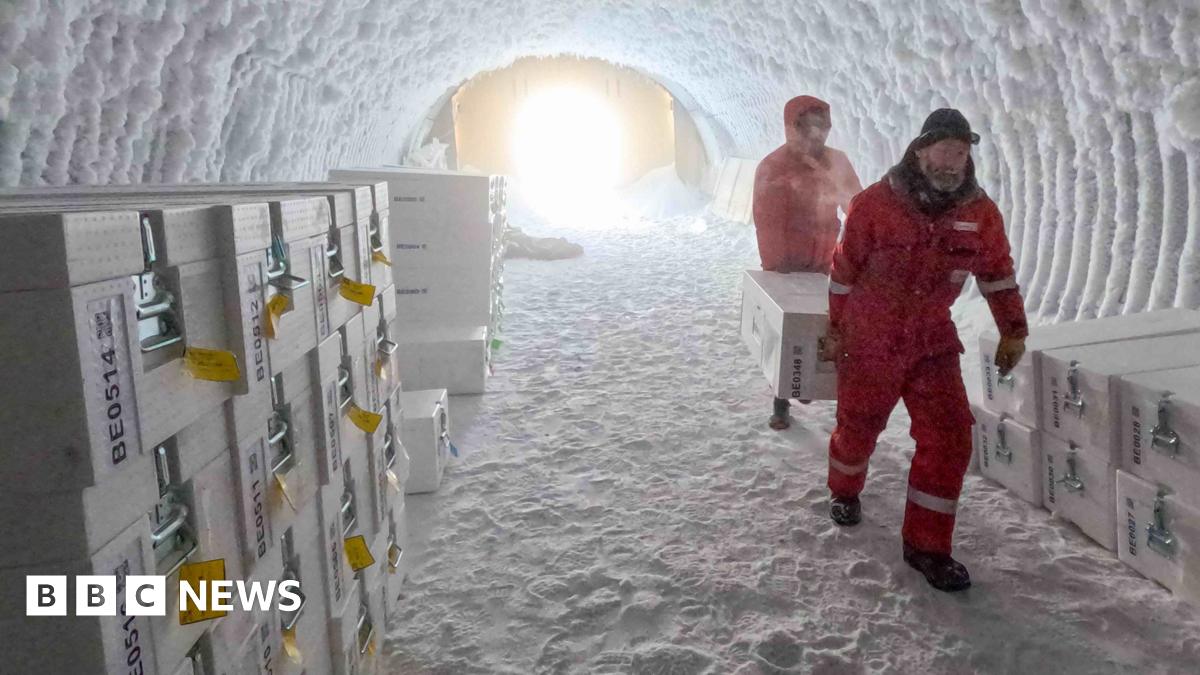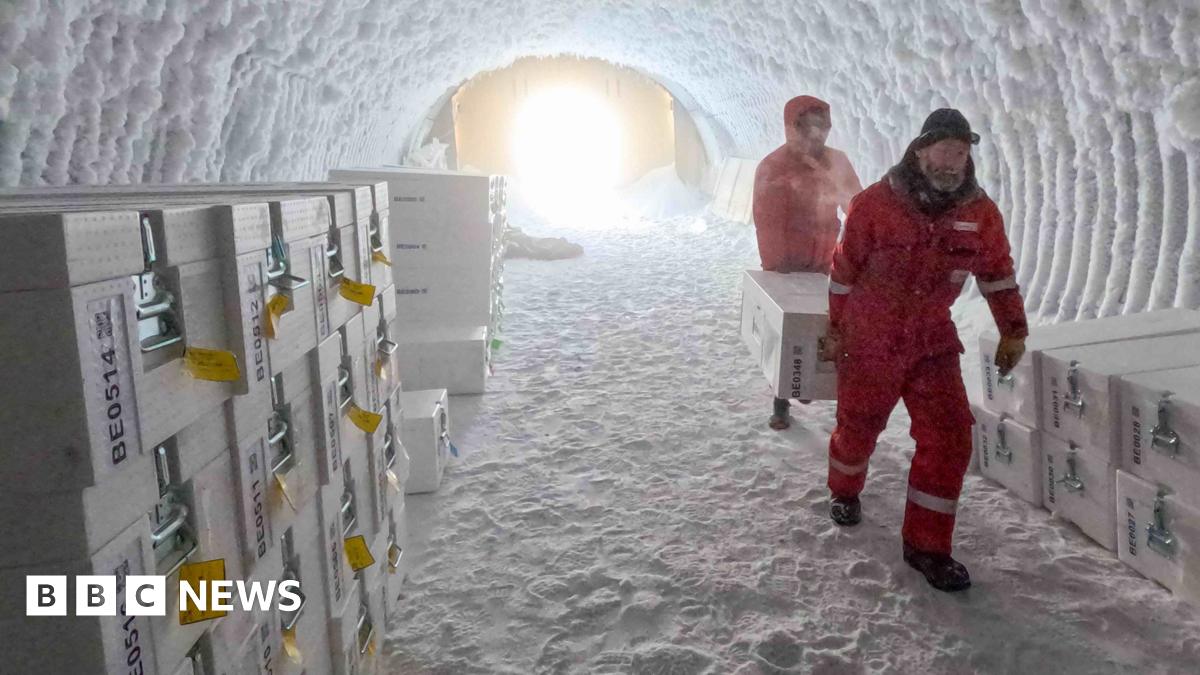Ancient Ice, 1.5 Million Years Old, To Be Melted For Scientific Research

Welcome to your ultimate source for breaking news, trending updates, and in-depth stories from around the world. Whether it's politics, technology, entertainment, sports, or lifestyle, we bring you real-time updates that keep you informed and ahead of the curve.
Our team works tirelessly to ensure you never miss a moment. From the latest developments in global events to the most talked-about topics on social media, our news platform is designed to deliver accurate and timely information, all in one place.
Stay in the know and join thousands of readers who trust us for reliable, up-to-date content. Explore our expertly curated articles and dive deeper into the stories that matter to you. Visit Best Website now and be part of the conversation. Don't miss out on the headlines that shape our world!
Table of Contents
Ancient Ice, 1.5 Million Years Old, to be Melted for Scientific Research: Unlocking Climate Secrets
A groundbreaking scientific endeavor is about to begin: the melting of 1.5-million-year-old ice cores extracted from Antarctica. This unprecedented research promises to unlock invaluable insights into Earth's ancient climate and offer crucial data to refine climate models and predict future climate change. The project, a collaboration between international research teams, represents a significant leap forward in paleoclimatology.
For decades, scientists have painstakingly extracted ice cores from the Antarctic ice sheet, each layer a time capsule preserving atmospheric conditions from millennia past. These cores contain trapped air bubbles and isotopic signatures providing a detailed record of past temperatures, greenhouse gas concentrations, and even volcanic activity. However, the discovery and extraction of ice dating back 1.5 million years – significantly older than previously accessible samples – marks a pivotal moment.
<h3>Unlocking the Secrets of the Mid-Pleistocene Transition</h3>
The period around 1.5 million years ago is scientifically significant due to the Mid-Pleistocene Transition (MPT). This geological epoch witnessed a dramatic shift in the Earth's glacial cycles, changing from cycles of approximately 41,000 years to cycles of approximately 100,000 years. Understanding the drivers behind this transition is crucial for improving our comprehension of long-term climate variability and predicting future climate change scenarios. The analysis of this ancient ice is expected to provide critical data on:
- Greenhouse gas concentrations: Precise measurements of ancient atmospheric composition, particularly carbon dioxide and methane levels, will provide a clearer picture of their role in driving the MPT.
- Temperature fluctuations: Analyzing isotopic ratios in the ice will reveal detailed temperature reconstructions, providing a high-resolution record of past climate variability.
- Atmospheric circulation patterns: Isotopic analysis can also shed light on past wind patterns and atmospheric circulation, offering insights into the dynamics of the global climate system.
- Volcanic activity: The presence of volcanic ash layers within the ice can be precisely dated, providing valuable information on past volcanic eruptions and their impact on climate.
<h3>The Challenges of Analyzing Ancient Ice</h3>
Melting such ancient ice requires extreme care and precision. Contamination must be meticulously avoided to ensure the accuracy of the results. The research teams involved have developed specialized protocols and cleanroom facilities to handle the precious samples. The process itself will be carefully documented and peer-reviewed to maintain the highest scientific standards.
<h3>Implications for Future Climate Prediction</h3>
The data gleaned from this ancient ice will be instrumental in improving climate models. By incorporating information from this previously inaccessible period, scientists will be able to refine their understanding of climate sensitivity and improve the accuracy of future climate projections. This is particularly critical for predicting the potential impacts of anthropogenic climate change and developing effective mitigation strategies.
<h3>A Collaborative Global Effort</h3>
This project represents a truly global collaboration, bringing together leading researchers from across the world. The international cooperation highlights the significance of this research and the shared commitment to understanding our planet's climate history. The findings will be made publicly available, allowing the broader scientific community to contribute to the analysis and interpretation of this invaluable dataset.
This ambitious undertaking marks a significant step forward in our understanding of Earth's climate history. The melting of this 1.5-million-year-old ice is not an end, but a beginning – a beginning of a deeper understanding of our planet's past, present, and future. Learn more about paleoclimatology and the importance of ice core research by visiting [link to a reputable scientific organization, e.g., NOAA or NASA].

Thank you for visiting our website, your trusted source for the latest updates and in-depth coverage on Ancient Ice, 1.5 Million Years Old, To Be Melted For Scientific Research. We're committed to keeping you informed with timely and accurate information to meet your curiosity and needs.
If you have any questions, suggestions, or feedback, we'd love to hear from you. Your insights are valuable to us and help us improve to serve you better. Feel free to reach out through our contact page.
Don't forget to bookmark our website and check back regularly for the latest headlines and trending topics. See you next time, and thank you for being part of our growing community!
Featured Posts
-
 New Skate Review Performance Features And Innovation
Jul 19, 2025
New Skate Review Performance Features And Innovation
Jul 19, 2025 -
 Chris Martin Faces Online Criticism Two Individuals Detail Their Negative Experiences
Jul 19, 2025
Chris Martin Faces Online Criticism Two Individuals Detail Their Negative Experiences
Jul 19, 2025 -
 Suspended Abbotts Labour Party Membership Under Review For Racism
Jul 19, 2025
Suspended Abbotts Labour Party Membership Under Review For Racism
Jul 19, 2025 -
 League Of Legends Gen Gs Absence From Msi Client Message Ignites Outrage
Jul 19, 2025
League Of Legends Gen Gs Absence From Msi Client Message Ignites Outrage
Jul 19, 2025 -
 North Carolina Democrats Vote For Israel Arms Embargo Amidst Leadership Silence
Jul 19, 2025
North Carolina Democrats Vote For Israel Arms Embargo Amidst Leadership Silence
Jul 19, 2025
Latest Posts
-
 Ancient Ice 1 5 Million Years Old To Be Melted For Scientific Study
Jul 20, 2025
Ancient Ice 1 5 Million Years Old To Be Melted For Scientific Study
Jul 20, 2025 -
 Your Weekend Watchlist 6 New Releases On Netflix Amazon Prime And Disney July 18 20
Jul 20, 2025
Your Weekend Watchlist 6 New Releases On Netflix Amazon Prime And Disney July 18 20
Jul 20, 2025 -
 Trumps Health Update Dr Gupta Offers Medical Perspective
Jul 20, 2025
Trumps Health Update Dr Gupta Offers Medical Perspective
Jul 20, 2025 -
 Carnivals Carnival Dream Returns First Cruise From New Orleans To New Resort Announced
Jul 20, 2025
Carnivals Carnival Dream Returns First Cruise From New Orleans To New Resort Announced
Jul 20, 2025 -
 Carnival Adds Ships Boosts Passenger Capacity In New Orleans
Jul 20, 2025
Carnival Adds Ships Boosts Passenger Capacity In New Orleans
Jul 20, 2025
